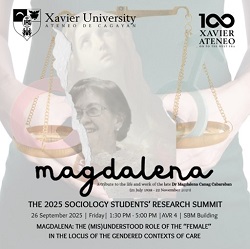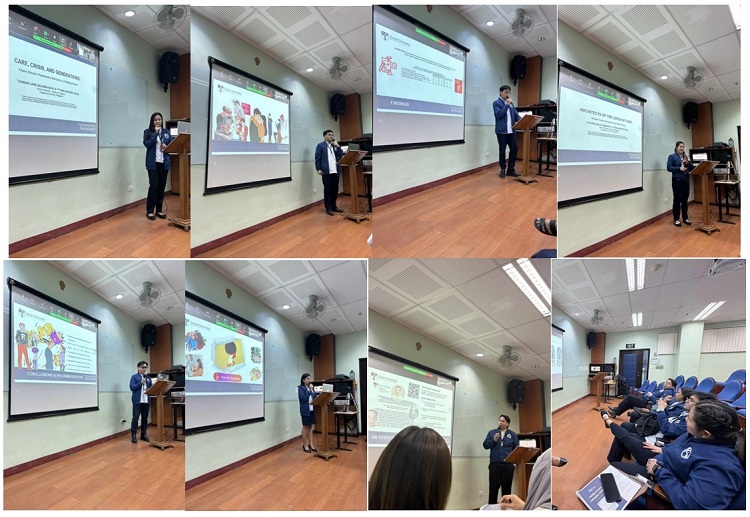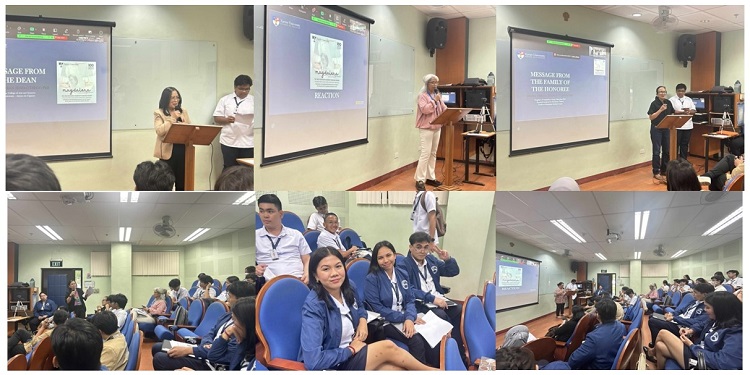
The 2025 Xavier University Sociology Students' Research Summit was hosted on Friday, 26 September 2025, at AVR 4 in the SBM Building of the Xavier University – Ateneo de Cagayan, Main Campus. Scholarly papers from undergraduate thesis projects each individually authored by six (6) senior undergraduate students were presented along with one (1) graduate student paper. The summit's title, “Magdalena: The (Mis)Understood Role of the ‘Female’ In the Locus of the Gendered Contexts of Care,” served as a powerful dual homage: first, to the late Dr Magdalena Canag Cabaraban, whose life's work championed women's concerns, reproductive health, and gender equity; and second, making a clear symbolic allusion to Mary Magdalene, whose historically (Mis)Understood and underrepresented role mirrors the systemic failure to acknowledge women's care labor today.
Academic papers presented during the summit collectively addressed the manifestation of the "weight of care" across critical spheres. The discourse began at the institutional level, where the integration of SDG 5 Gender Equality onto educational systems was examined along with the challenge of educational care responsibilities when exceeding institutional carrying capacity.

The presentations were unified by the critical conceptual lens of “The Weight of Care.” This central theme explored the profound, often unseen, and disproportionately gendered burden of labor required to sustain individuals, relationships, and institutions in the Philippines. The discourse was directly connected to the imperative for social systems to actively integrate sustainable goals and recognize the necessity of formally acknowledging women's substantial, yet often unappreciated, care labor within society.
The majority of the researches presented also focused on the familial and relational spheres, highlighting how the burden of care is socialized and enforced. Papers investigated the intense pressure placed on eldest Filipino daughters to assume secondary parental roles, the negotiation of gendered expectations in newly formed heterosexual relationships, and the evolving attitudes towards marriage as a critical locus and springboard for sustained relational care. One paper explored the enduring nature of gender scripts, showing how the ‘feminine’ care role—encompassing emotional labor and nurturing—is internalized and even expected within non-heteronormative male-male partnerships, illustrating the pervasive nature of heteronormative burdens. Finally, the theme extended to personal well-being, with research asserting that reproductive self-care among Filipino women is not merely an individual concern, but a critical practice that underpins their ability to contribute to social care roles, thus demanding it be acknowledged as an essential form of social care.
Learn more about this year’s summit |
|

The summit's afternoon program featured welcome remarks from Dr Wynne Josephine Gambe Escol, Chair of The Department of Sociology & Anthropology, followed by messages from Dean Dr Judy Pacturan Sendaydiego and Summit Convener Don Antonio Velez. After the student presentations, distinguished reactors offered their feedback: Dennise Edwina S Gonzales from the Gender and Development Office of Xavier University, Dr Maria Teresa Sharon C Linog, MD, a Research Associate at the Research Institute for Mindanao Culture (RIMCU), Hamilcar B Chanjueco Jr, the Supervising Gender and Development Specialist at the Philippine Commission on Women, and Dr Wynne Josephine Gambe Escol. The successful day concluded with a conversation session, a message from the family of Dr Magdalena C Cabaraban delivered by Dr Linog, and the closing remarks from Dr Chona Patricia Rebosura Echavez, Director of The Research Institute for Mindanao Culture (RIMCU).
All seven presenters are now set to take their research to the international stage as confirmed presenters at the 2025 International Conference of the Philippine Sociological Society (PSS), hosted by Ateneo de Davao University from 1 to 3 October 2025, under the theme “Sociology of Crisis and Care: Navigating Tensions, Charting Alternatives.”
